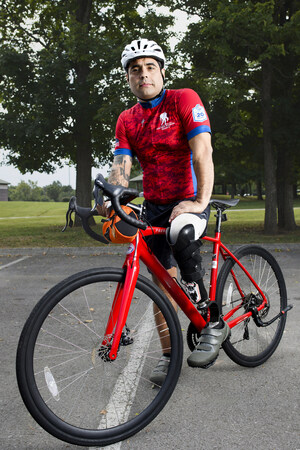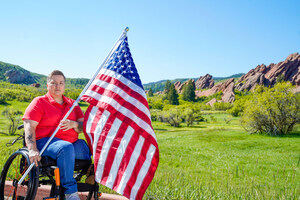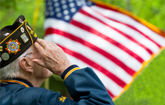
The Odyssey To Recovery
A Closer Look at Wounded Warrior Project's Project Odyssey During Men's Health Week
JACKSONVILLE, Fla., June 11, 2015 /PRNewswire-USNewswire/ -- Wounded Warrior Project® (WWP) offers combat veterans with combat stress or post-traumatic stress disorder (PTSD) an intense recovery retreat referred to as Project Odyssey®. Project Odyssey falls under WWP's Combat Stress Recovery Program (CRSP), which helps warriors and their families maintain healthy, meaningful relationships while pursuing life goals free from the barriers or stigmas associated with mental health issues.
The program name, Project Odyssey, is derived from Homer's epic poem about overcoming adversity and finding one's way home. These themes mirror a veteran's own odyssey to overcome the struggles associated with combat and transition to his or her new normal at home with family and friends.
Selection criteria for combat veterans who apply for Project Odyssey is incredibly crucial to the process.
"Not only do warriors need to be motivated, personally they need to be at a point in their recovery where they can best absorb all the benefits the retreat offers," said Michael Richardson, independence services and mental health executive vice president for WWP. "Peer support plays a tremendous role at these retreats, so it is incredibly important for all attendees to be in a stable condition, both mentally and emotionally. Each person brings something unique to the experience—including their emotions and struggles—that can and will impact the group's ability to heal through the process."
At WWP, peer support is so essential to the recovery process that Wounded Warrior Project created a specific program to support the effort called the WWP Peer Support program. Peer support can be found in every WWP program and service offered. The goal of the Peer Support program is for every warrior being mentored to eventually mentor another warrior, thus embodying the WWP logo of one warrior carrying another. By becoming a Peer Mentor, warriors who once were the warrior being carried have the opportunity to become the warrior who carries others. The power of peer support is most evident in Project Odyssey, where one of the main emphases centers on team building.
"Often, the combat veterans who attend Odyssey have been isolating themselves and they feel alone and crazy for their feelings, thinking no one understands them," said John Roberts, WWP warrior relations executive vice president and wounded service member. "The thing that impacts warriors the most is being around other combat veterans who are experiencing the same symptoms and facing the same challenges associated with combat stress and PTSD."
Project Odyssey® uses powerful, outdoor rehabilitative methods to encourage connections with nature, peers, mentors and trained counselors.
"When the attendees start opening up with one another, that's when Project Odyssey is the most powerful," said Roberts. "They begin to share their stories of struggles and success—it not only builds a bond between kindred spirits, it also reminds them that they are not alone in their recovery and that there are resources available for those who seek help."
Using experiential learning, Project Odyssey participants can process PTSD experiences with a goal of improving everyday functionality in their lives. During retreats, warriors often set and are later held accountable for meeting goals toward their recovery.
"It is important for them to feel the strength in teamwork again," said Roberts. "The ultimate trust that is required when committing to someone's wellbeing is something of rare circumstance. It's hard to describe to those who never had someone's life in their hands. Still, when a combat service member transitions to civilian life, that service—that pledge—is sometimes the most powerful void that needs to be addressed."
Setting substantial recovery goals, and being held accountable to them, is what makes the program successful. Typically, the CSRP team will follow up with the combat veteran 30, 60 and 90 days after the event to determine where he or she is in regards to accomplishment. Sometimes goals need to be readjusted, sometimes they are exceeded, and the warrior makes new goals; either way, the object of the program is recovery progression.
There are 20 designated CSRP offices across the United States and Germany. Project Odyssey retreats are organized by gender and couples. To best serve injured veterans at the local level, each office hosts four male retreats, as well as one female retreat and one couple retreat annually. Outdoor activities intended to challenge the combat veteran include: hiking, fishing, zip-lining, challenge courses, skeet shooting, canoeing, rock climbing, repelling, swimming with dolphins, parasailing, and snorkeling. Recently Project Odyssey launched the first Rolling Odyssey, featuring motorcycles and the open road.
Men's Health Week is June 15-21. WWP encourages all combat veterans who are WWP alumni to apply for Project Odyssey through the WWP website, resource center or a CSRP staff member. If you or someone you know is interested in Project Odyssey, please contact the WWP Resource Center at [email protected] or 888.WWP.ALUM (997.2586).
About Wounded Warrior Project
The mission of Wounded Warrior Project® (WWP) is to honor and empower Wounded Warriors. WWP's purpose is to raise awareness and to enlist the public's aid for the needs of injured service members, to help injured servicemen and women aid and assist each other, and to provide unique, direct programs and services to meet their needs. WWP is a national, nonpartisan organization headquartered in Jacksonville, Florida. To get involved and learn more, visit woundedwarriorproject.org.
SOURCE Wounded Warrior Project







Share this article